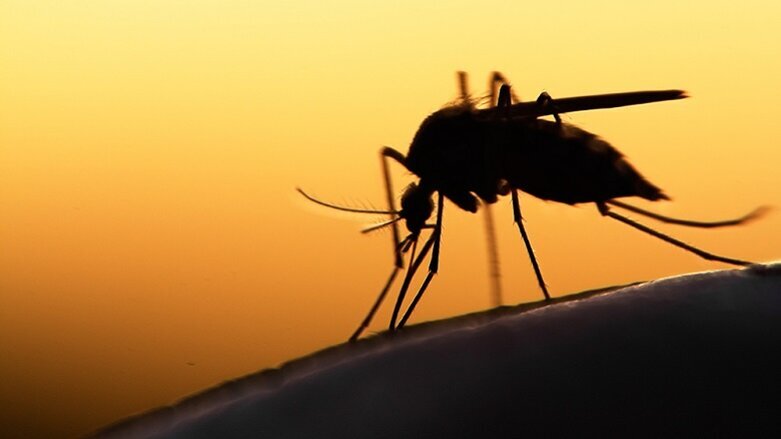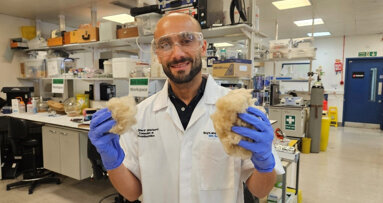MANCHESTER/CAMBRIDGE, UK: Over half a million deaths per year result from malaria, caused by parasites of the genus Plasmodium, and with increasing resistance to all existing drugs, there is an urgent need to develop new medication. Approximately 90 per cent of these deaths are due to Plasmodium falciparum, the parasite responsible for the most severe forms of the disease. Researchers have now investigated triclosan—a simple antimicrobial agent commonly found in toothpastes—as a potential antimalarial substance.
Upon biting someone, a mosquito infected with malaria parasites transfers the parasites into the bloodstream via its saliva. These parasites travel to the liver, where they mature and reproduce, and later leave the liver and hijack red blood cells, where they continue to multiply, spreading around the body.
Triclosan in toothpaste prevents the build-up of plaque bacteria by inhibiting the action of an enzyme known as enoyl reductase (ENR), which is involved in the production of fatty acids. Triclosan and its analogues have been repeatedly shown to inhibit the growth of blood-stage P. falciparum in culture, and it was assumed that triclosan was targeting ENR, which is found in the liver. However, subsequent work showed that improving triclosan’s ability to target ENR had no effect on parasite growth in the blood.
Using “Eve”, an artificially intelligent “robot scientist” based at the University of Manchester’s School of Computer Science, the researchers, from the University of Cambridge, discovered that triclosan affects parasite growth by specifically inhibiting an enzyme of the malaria parasite, called dihydrofolate reductase (DHFR).
In a statement released by the University of Manchester, lead author Dr Elizabeth Bilsland said: “The discovery by our robot ‘colleague’ Eve that triclosan is effective against malaria targets offers hope that we may be able to use it to develop a new drug. We know it is a safe compound, and its ability to target two points in the malaria parasite’s lifecycle means the parasite will find it difficult to evolve resistance.”
DHFR is the target of a well-established antimalarial drug, pyrimethamine; however, resistance to the drug among malaria parasites is common, particularly in Africa. The Cambridge team showed that triclosan was able to target and act on this enzyme even in pyrimethamine-resistant parasites.
The study, titled “Plasmodium dihydrofolate reductase is a second enzyme target for the antimalarial action of triclosan”, was published in the Scientific Reports journal on 18 January 2018.
Tags:
CARDIFF, UK: Together with Norwegian biopharmaceutical company AlgiPharma, researchers at Cardiff University have been working on new drugs to combat ...
EDINBURGH, UK: A study by researchers at the University of Edinburgh has shown that a natural chemical related to those found in liquorice root could help ...
LONDON, UK: Though the relative benefits of chewing gum are often subject to debate, a number of studies have shown that the sugar-free varieties can ...
A new method of controlling inflammation and sugar levels for oral and systemic disease prevention using a common diabetes drug has been discovered by a ...
BRISTOL, UK/BOSTON, US: The thickness of growth marks in primary teeth may help identify children at risk for depression and other mental health disorders ...
The advent of clear aligners, digital scanners, 3D printing and artificial intelligence is transforming orthodontics. These technologies offer patients a ...
DUMFRIES, Scotland: After years of governmental neglect, the UK is now in the middle of a public dental health crisis. Caused mainly by underfunding and ...
LONDON, England: A pioneering study from King’s College London has revealed that keratin—sourced from human hair or wool—can form a crystalline ...
BANBURY, England: Traditional toothpaste tubes present environmental and practical challenges because they are often excluded from standard recycling ...
DUBLIN, Ireland: Sustainability is now widely recognised as a core responsibility in dentistry, although translating this into measurable action remains ...
Live webinar
Tue. 24 February 2026
6:00 pm UTC (London)
Prof. Dr. Markus B. Hürzeler
Live webinar
Tue. 24 February 2026
8:00 pm UTC (London)
Prof. Dr. Marcel A. Wainwright DDS, PhD
Live webinar
Wed. 25 February 2026
4:00 pm UTC (London)
Prof. Dr. Daniel Edelhoff
Live webinar
Wed. 25 February 2026
6:00 pm UTC (London)
Live webinar
Thu. 26 February 2026
1:00 am UTC (London)
Live webinar
Tue. 3 March 2026
4:00 pm UTC (London)
Dr. Omar Lugo Cirujano Maxilofacial
Live webinar
Wed. 4 March 2026
1:00 am UTC (London)
Dr. Vasiliki Maseli DDS, MS, EdM



 Austria / Österreich
Austria / Österreich
 Bosnia and Herzegovina / Босна и Херцеговина
Bosnia and Herzegovina / Босна и Херцеговина
 Bulgaria / България
Bulgaria / България
 Croatia / Hrvatska
Croatia / Hrvatska
 Czech Republic & Slovakia / Česká republika & Slovensko
Czech Republic & Slovakia / Česká republika & Slovensko
 France / France
France / France
 Germany / Deutschland
Germany / Deutschland
 Greece / ΕΛΛΑΔΑ
Greece / ΕΛΛΑΔΑ
 Hungary / Hungary
Hungary / Hungary
 Italy / Italia
Italy / Italia
 Netherlands / Nederland
Netherlands / Nederland
 Nordic / Nordic
Nordic / Nordic
 Poland / Polska
Poland / Polska
 Portugal / Portugal
Portugal / Portugal
 Romania & Moldova / România & Moldova
Romania & Moldova / România & Moldova
 Slovenia / Slovenija
Slovenia / Slovenija
 Serbia & Montenegro / Србија и Црна Гора
Serbia & Montenegro / Србија и Црна Гора
 Spain / España
Spain / España
 Switzerland / Schweiz
Switzerland / Schweiz
 Turkey / Türkiye
Turkey / Türkiye
 UK & Ireland / UK & Ireland
UK & Ireland / UK & Ireland
 International / International
International / International
 Brazil / Brasil
Brazil / Brasil
 Canada / Canada
Canada / Canada
 Latin America / Latinoamérica
Latin America / Latinoamérica
 USA / USA
USA / USA
 China / 中国
China / 中国
 India / भारत गणराज्य
India / भारत गणराज्य
 Pakistan / Pākistān
Pakistan / Pākistān
 Vietnam / Việt Nam
Vietnam / Việt Nam
 ASEAN / ASEAN
ASEAN / ASEAN
 Israel / מְדִינַת יִשְׂרָאֵל
Israel / מְדִינַת יִשְׂרָאֵל
 Algeria, Morocco & Tunisia / الجزائر والمغرب وتونس
Algeria, Morocco & Tunisia / الجزائر والمغرب وتونس
 Middle East / Middle East
Middle East / Middle East


















































To post a reply please login or register